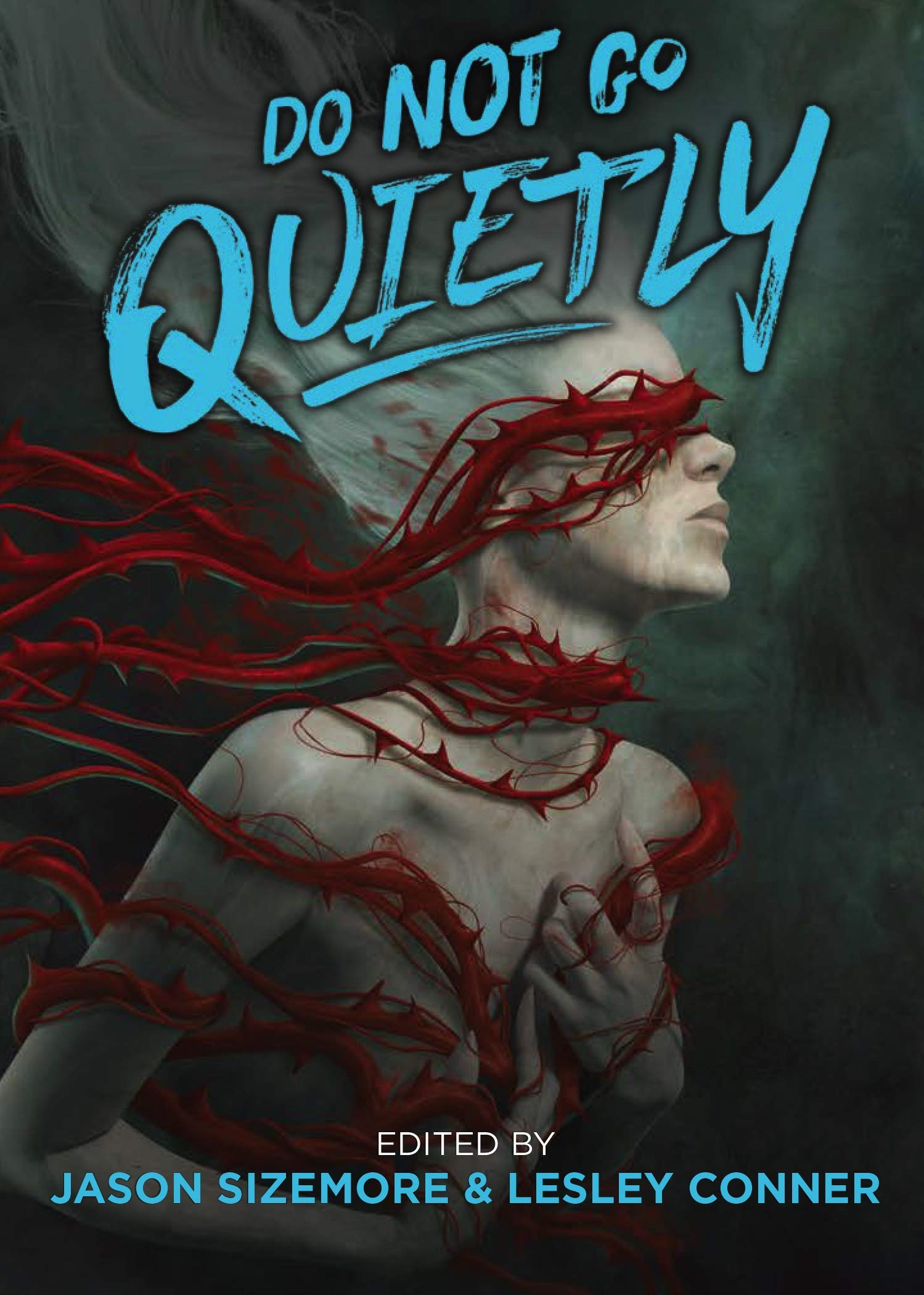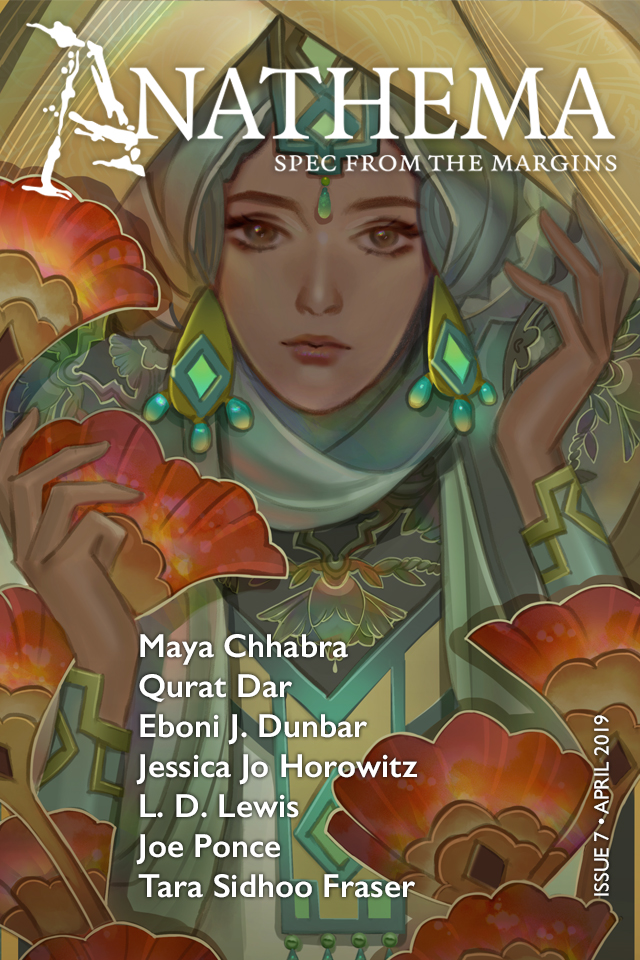My favorite stories from May all happened to be about resistance. They all had good and satisfying endings, although none of them had a clean ending where everything was wrapped up neatly with a bow. Then again, I don’t think resistance often works that way.
First, I loved “Everything is Closed Today” by Sarah Pinsker. It’s delightful tale about skater girls, activism, and building community, and it appears in Do Not Go Quietly: An Anthology of Victory in Defiance edited by Jason Sizemore and Lesley Conner. Next, I recommend Joe Ponce’s “Raices (Roots),” which appears in Issue 7 of Anathema: Spec from the Margins. It’s a powerful and important story about immigration, border justice, and political consciousness. Lastly, if you love academic scholarship and theory — or, for that matter, if you hate those things — you must check out “Ten Excerpts from an Annotated Bibliography on the Cannibal Women of Ratnabar Island” by Nibedita Sen in Issue 80 of Nightmare Magazine.
Now, on to the reviews!

“Everything Is Closed Today” by Sarah Pinsker
After a massive terrorist attack at a baseball stadium, pretty much everything shuts down. Businesses, malls, schools, and libraries are all closed due to vague and unspecified threats. Hospitals and convenience stores are still open. Grocery stores will deliver if you shop online. Netflix is still up, but for some reason, news sites and social media platforms are either down altogether or unusably slow. Maybe there is a real danger of additional attacks, but the main characters aren’t told any details about it. Instead, everything is just … closed. After the attack, Mae’s partner Dana has been working overtime at the hospital, but Mae is stuck at home since she’s a library assistant and the library is closed. Mae needs something to do with all her unwanted time off, so she ends up teaching the bored neighbor girls how to skateboard.
In some ways, this story feels a little too far-fetched. How can practically everything shut down for days on end with no detailed explanation given? I feel like these days the news and social media never shut up or chill out, so it strained my suspension of disbelief to imagine them going silent and becoming inaccessible for so long. However, Sarah Pinsker writes so well that this far-fetched setup nonetheless feels plausible, believable, and real. Pinsker’s prose is clear and captivating, and the characters feel real and relatable. As I read the story, I had no trouble suspending my disbelief because it’s simultaneously so far-fetched and yet so believable, this story feels like a Twilight Zone episode or alternate reality that’s just next door. It forced me to question my initial assumptions and to question my confidence in the general stability of our social and political structures. That’s not something most stories make me do, and I enjoyed having to do that.
I think Pinsker’s characters in this story are all well-written. In particular, I really loved the character of Mae. Mae feels powerless, and in some ways she is. She’s a library assistant who doesn’t even work full-time. She doesn’t have much economic, political, or social capital. But as the story progresses, Mae makes a significant difference within her local community. The neighborhood girls are bored and aimless on their own, but they quickly take to Mae as their leader and teacher. She not only teaches them how to skateboard, but she also teaches them about activism and how to care for their community. Meanwhile, as a side project, Mae starts a small library in the lobby of her apartment building. Despite seeming so powerless at first, Mae actually does a lot of good!
Despite the dark setup, the heart of this story is cozy and warm and gives me so many good feels. It features a cute lesbian couple, one of whom is a library assistant, and the story is about creating an activist gang of skater girls and trying to improve your community against daunting odds. I’ve read three Trump-era anthologies now, and this may be the most hopeful and energizing story for our contemporary political moment that I’ve read yet.

“Raices (Roots)” by Joe Ponce
Jerry’s half-sister Lola and her family are fleeing Veracruz, Mexico to escape drug cartels and corrupt police. Jerry lives near the US/Mexico border, and Lola and her six-year-old son are staying with him while they wait for Lola’s husband and older son to join them. However, not everything is going according to plan. Lola’s husband and older son are apprehended at the border, and immigrants are at the center of a mysterious epidemic in which people are becoming tree-like: growing branches, leaves, and bark.
Jerry is a complex, interesting character. He’s surrounded by prejudice toward and hatred of immigrants, and he has definitely internalized a fair deal of that. When the story opens, he slightly resents the imposition of Lola and Macho. While Jerry does care about Lola and her family, he mostly wants them to be reunited so that they can all move on and move out of his life. Though it’s ill-founded, his desire for “normalcy” is understandable: he just wants to be left alone and left out of the political drama and struggle. However, as the story progresses and develops, he slowly realizes that he can’t just stand on the sidelines, that he is inescapably part of this story, and that he has to act.
One of the reasons I like to read fiction is that it can make you to confront something challenging. In my recent review of Cory Doctorow’s Radicalized, I shared that I had gone mostly numb to our society’s epidemic of gun violence. When I heard about the recent shooting in Virginia, for example, I mostly reacted with staid passivity. But reading Doctorow’s Radicalized forced me to slow down, process, and feel this horrific part of our world that I had largely gone numb to.
And as I read “Raices (Roots),” I found myself doing just that, but this time in regard to a different issue: immigration and border justice. Here again, we have a piece of our world that is horrific and appalling — and that I’ve grown much number to than I probably should. That numbness is a useful defensive mechanism, but it’s also important to feel the weight of the world sometimes. I’m grateful to stories like this one that can help me do that. As I read this story, my numbness slowly transformed into pain and then again into political resolve, not unlike Jerry’s gradual political awakening.
Lastly, it must be said that the fantastic element in this story is, well, fantastic. This story literalizes metaphor in a really striking way: immigrants and refugees just want to live somewhere safe and be able to put down roots, and as the hatred and vitriol toward immigrants grows, so do the immigrants — they literally grow branches, leaves, bark, and roots. When faced with this strange outbreak, white America effectively goes to war against immigrants and brown people rather than genuinely helping or welcoming them. The racism and xenophobia present in this story are horrific, although the story as a whole is not without hope. At the end, both the xenophobia and the mysterious epidemic accelerate into overdrive, and the story concludes with a pair of really striking images that won’t be leaving my mind anytime soon.

“Ten Excerpts from an Annotated Bibliography on the Cannibal Women of Ratnabar Island” by Nibedita Sen
As the title says, this story consists of ten excerpts from an annotated bibliography. The citations are both plausible and hilarious. For example, one citation — “The Subaltern Will Speak, If You’ll Shut Up and Listen” — is a clear reference to the well-known essay “Can the Subaltern Speak?” by postcolonial scholar and critic Gayatri Chakravorty Spivak. Although this story is written in the form of an academic text, it actually subverts that form and criticizes the academy for perpetuating sexism, racism, and colonialism. So the unique form isn’t just a gimmick — it’s central to the piece.
Within this story, Westerners are horrified by the cannibal women of Ratnabar Island, and scholars opine and theorize about the Ratnabari and about cannibalism. Meanwhile, the Westerner scholars overlook their own form of cannibalism: how they silence, marginalize, and consume (“eat”) the other. For example, they cite other white scholars to explain the Ratnabari and their practices rather than citing members of the Ratnabari diaspora themselves. As Sen says in the accompanying author interview, “‘Ten Excerpts’ is a pointed middle finger at how colonialism Others and declares monstrous the very cultures it, itself, is in the process of devouring.” Cannibalism thus becomes a striking symbol of colonialism, appropriation, and hypocrisy.
Another thing that makes this story remarkable is how it handles history. This is a 1,500-word piece that very effectively tells a story with a 100+ year timeline. It features both primary and secondary sources, both “high” theory and sources written for popular audiences. And it all comes together so well, advancing not only the timeline of events but also the related commentary, debates, and scholarship. And the ending is marvelous: it’s fiery, fierce, and surprising.
I have a particular fondness for stories that deal with academia and scholarship. Two recent such stories that I’ve reviewed and loved were Marie Brennan’s “Vīs Dēlendī” and “The Thing About Ghost Stories” by Naomi Kritzer. If you like this piece, I recommend you check out those as well.







